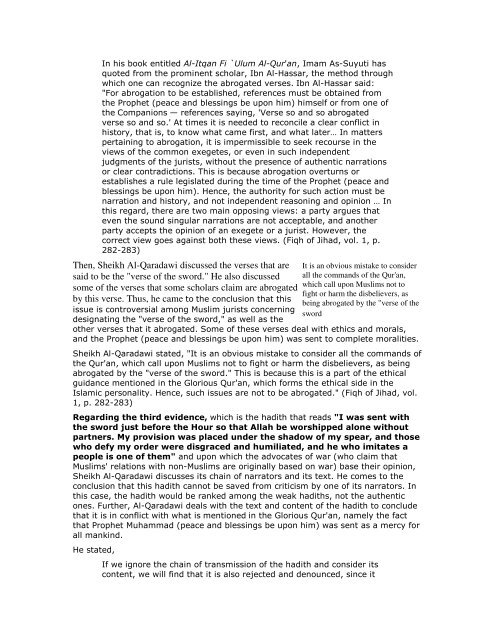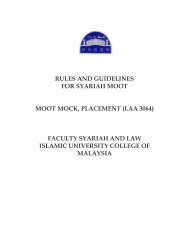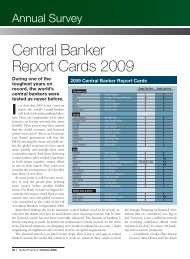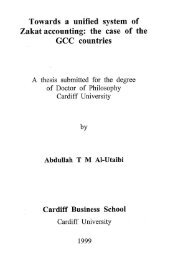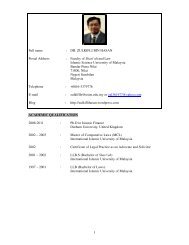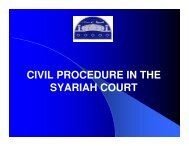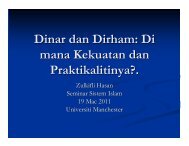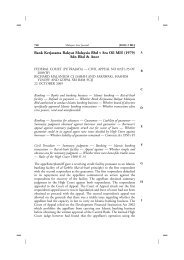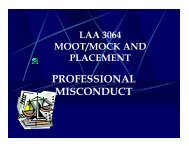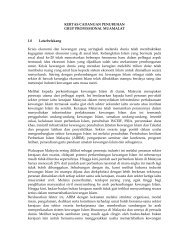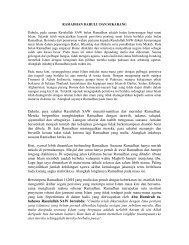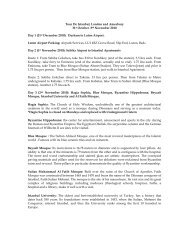Fiqh al Jihad Sheikh Yusuf al Qaradhawi
Fiqh al Jihad Sheikh Yusuf al Qaradhawi
Fiqh al Jihad Sheikh Yusuf al Qaradhawi
Create successful ePaper yourself
Turn your PDF publications into a flip-book with our unique Google optimized e-Paper software.
In his book entitled Al-Itqan Fi `Ulum Al-Qur'an, Imam As-Suyuti has<br />
quoted from the prominent scholar, Ibn Al-Hassar, the method through<br />
which one can recognize the abrogated verses. Ibn Al-Hassar said:<br />
"For abrogation to be established, references must be obtained from<br />
the Prophet (peace and blessings be upon him) himself or from one of<br />
the Companions — references saying, 'Verse so and so abrogated<br />
verse so and so.' At times it is needed to reconcile a clear conflict in<br />
history, that is, to know what came first, and what later… In matters<br />
pertaining to abrogation, it is impermissible to seek recourse in the<br />
views of the common exegetes, or even in such independent<br />
judgments of the jurists, without the presence of authentic narrations<br />
or clear contradictions. This is because abrogation overturns or<br />
establishes a rule legislated during the time of the Prophet (peace and<br />
blessings be upon him). Hence, the authority for such action must be<br />
narration and history, and not independent reasoning and opinion … In<br />
this regard, there are two main opposing views: a party argues that<br />
even the sound singular narrations are not acceptable, and another<br />
party accepts the opinion of an exegete or a jurist. However, the<br />
correct view goes against both these views. (<strong>Fiqh</strong> of <strong>Jihad</strong>, vol. 1, p.<br />
282-283)<br />
Then, <strong>Sheikh</strong> Al-Qaradawi discussed the verses that are<br />
said to be the "verse of the sword." He <strong>al</strong>so discussed<br />
some of the verses that some scholars claim are abrogated<br />
by this verse. Thus, he came to the conclusion that this<br />
issue is controversi<strong>al</strong> among Muslim jurists concerning<br />
designating the "verse of the sword," as well as the<br />
other verses that it abrogated. Some of these verses de<strong>al</strong> with ethics and mor<strong>al</strong>s,<br />
and the Prophet (peace and blessings be upon him) was sent to complete mor<strong>al</strong>ities.<br />
<strong>Sheikh</strong> Al-Qaradawi stated, "It is an obvious mistake to consider <strong>al</strong>l the commands of<br />
the Qur'an, which c<strong>al</strong>l upon Muslims not to fight or harm the disbelievers, as being<br />
abrogated by the "verse of the sword." This is because this is a part of the ethic<strong>al</strong><br />
guidance mentioned in the Glorious Qur'an, which forms the ethic<strong>al</strong> side in the<br />
Islamic person<strong>al</strong>ity. Hence, such issues are not to be abrogated." (<strong>Fiqh</strong> of <strong>Jihad</strong>, vol.<br />
1, p. 282-283)<br />
Regarding the third evidence, which is the hadith that reads "I was sent with<br />
the sword just before the Hour so that Allah be worshipped <strong>al</strong>one without<br />
partners. My provision was placed under the shadow of my spear, and those<br />
who defy my order were disgraced and humiliated, and he who imitates a<br />
people is one of them" and upon which the advocates of war (who claim that<br />
Muslims' relations with non-Muslims are origin<strong>al</strong>ly based on war) base their opinion,<br />
<strong>Sheikh</strong> Al-Qaradawi discusses its chain of narrators and its text. He comes to the<br />
conclusion that this hadith cannot be saved from criticism by one of its narrators. In<br />
this case, the hadith would be ranked among the weak hadiths, not the authentic<br />
ones. Further, Al-Qaradawi de<strong>al</strong>s with the text and content of the hadith to conclude<br />
that it is in conflict with what is mentioned in the Glorious Qur'an, namely the fact<br />
that Prophet Muhammad (peace and blessings be upon him) was sent as a mercy for<br />
<strong>al</strong>l mankind.<br />
He stated,<br />
It is an obvious mistake to consider<br />
<strong>al</strong>l the commands of the Qur'an,<br />
which c<strong>al</strong>l upon Muslims not to<br />
fight or harm the disbelievers, as<br />
being abrogated by the "verse of the<br />
sword<br />
If we ignore the chain of transmission of the hadith and consider its<br />
content, we will find that it is <strong>al</strong>so rejected and denounced, since it


